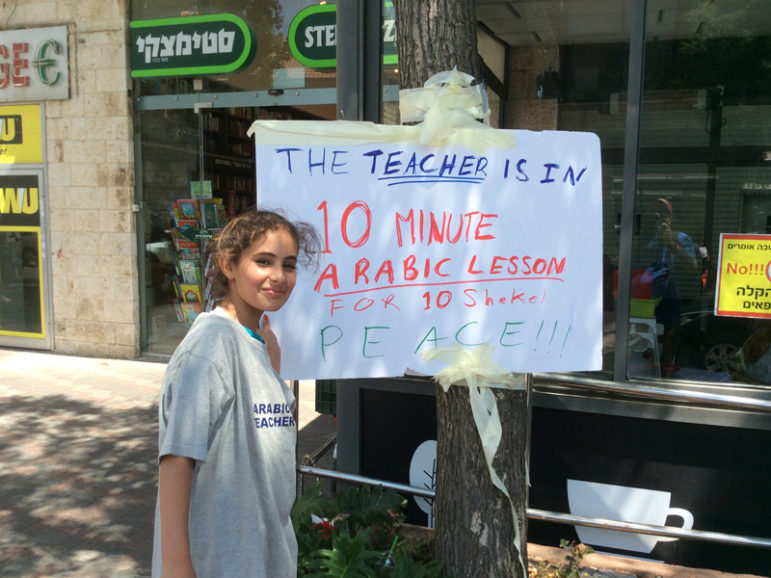(RNS) You’ve heard of micro-aggressions?
Welcome to micro-peace.
Peace by piece, if you will.
So here I am in Jerusalem. It is Friday afternoon, and Shabbat is coming. The streets are bustling with pre-Shabbat activity, which means aerobic shopping (remember — stores are closed on Shabbat).
And right there, in the middle of the sidewalk on Emek Refaim in Jerusalem’s German Colony, a young girl, about ten years old, has set up a table. She is not selling lemonade, despite the fact that that it’s in the high 90s. (Some yeshiva kids are doing precisely that, right next to her).
No — she is advertising Arabic lessons. Ten minutes for ten shekels — approximately $2.50.
How could I refuse? I had been wanting to study Arabic (granted, in a deeper fashion). Considering the fact that on the same block, Ulpan is selling Hebrew lessons (which is a wonderful program) for considerably more shekels, this is a good deal.
I hand over my shekels.
“Who is the teacher?” I ask.
“I am the teacher,” the young girl responds, with an air of self-confidence that totally belies her age.
So, we sit down. She hands me a sheet of Arabic vocabulary. I learn a few basic terms; she tests me; I meet her father, lingering nearby.
After ten minutes, I hardly know that much more Arabic than before I entered her sidewalk “classroom.”
That’s OK.
Because look at the photo, and look at why she was doing this in the first place.
“Peace.”
Like I said, a micro-peace. A piece of piece.
As my Israeli friends will confirm, Israel is filled with numerous examples of micro-peaces. It is not as if Israelis and Palestinians are walking around, ready to kill each other at the drop of a felafel ball. One of the things that impressed me on this, my most recent trip, is how open Israeli society really is. Israelis, Israeli Arabs, and Palestinians freely mingle on the streets, especially in west Jerusalem.
My young tutor knew why she was doing what she was doing. Sure — the “ten shekels for ten minutes” program was probably lucrative, at least on a child’s level. You have to give her credit; this is, after all, “start up nation,” and she had her own educational startup.
Come back in fifteen years, and she will have created a chain of Arabic schools.
But, she was doing this, because in her young soul, she sensed that if Jews — Israelis and tourists — can learn just a little bit of Arabic, then perhaps there is a small amount of hope for peace. For to be able to speak each other’s language (moral and linguistic) is the gateway to the possibility of peace.
Of shalom.
Of salaam (which, to be fair, does not mean exactly what we imagine “shalom” to mean — which itself, by the way, is not always what we imagine “shalom” to mean).
I know what some of you are thinking. “You just gave a Palestinian kid ten shekels? She’s going to grow up to become: A) a radical Islamist, or B) a terrorist.
Oh, cut it out. Not now — please.
I am thinking of the growing Palestinian culture of death, in which adults celebrate the death of children — not only Israeli children, but their own children as well. This is a culture where adults get nachas (pleasure) from their children growing up to become shahid, martyrs in the cause of spreading death.
(Last week, my friends and I are at the Sarona market in Tel Aviv. We chose deliberately to have dessert at Max Brenner, the chocolate emporium that had been the recent site of terror. Things had returned to normal — even eerily so. It was as if the workers there, at least some of them might have been there at the time, had at least outwardly chosen not to remember what had happened. We ate there as a way of aggressively shaking our fists at the murderers. Also because the chocolate was amazing. Mostly that).
Perhaps my young tutor will be the kid who breaks the addiction to this culture. Perhaps this girl will be the one who says: No more. Enough.
Maybe she will be the one who will point out the linguistic factoid that the word for Hebrew, ivri, contains the same letters as aravi, Arabic.
A little optimism in a week of such pain in America? A little bit of hope?
You got a better idea?
As the classic Hebrew poet, Shaul Tchernikovsky wrote (and I paraphrase): “Laugh at all my dreams. I still believe in humanity.”






